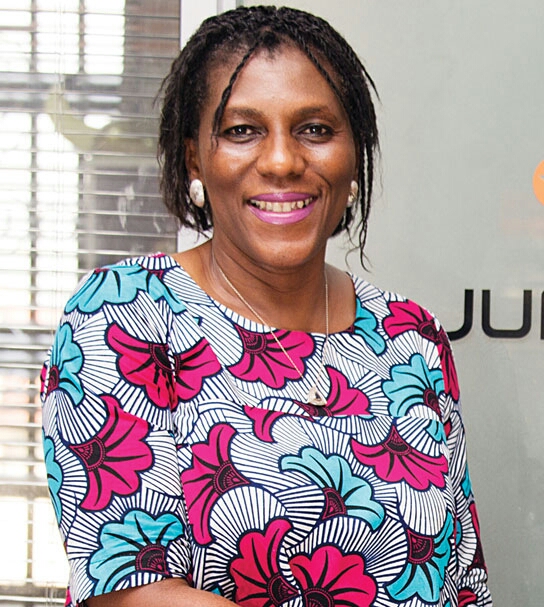E-Financial
Jumia Commends Framework For eCommerce Regulation in Nigeria

Mrs Juliet Anammah, Chief Executive Officer of Jumia Nigeria has described the recent tripartite motion by the Consumer Protection Council (CPC), the Standard Organisation of Nigeria (SON), and the Nigeria Custom Service (NCS) on the urgent need for government to develop a framework to regulate the activities of eCommerce platforms in Nigeria, as a round peg in a round hole.
She assured the government that Jumia will continue to offer necessary supports to ensure such framework is developed with the purpose of protecting unsuspecting shoppers online.
Anammah who made the disclosure in an interview with the Lagos studio of the China Global Television Network (CGTN), said: “we’re committed to helping government agencies understand how ecommerce operates.
“Even though it’s a section of retail, it is still a sub-sector of the total retail market. Because it is digital, there are some differentiations; we’re committed to helping government understand how that operates, how it has advanced in other countries, and what is coming ahead, because regulation isn’t just about constricting, it’s about supporting.”
“So the government wants to support it so it can grow in a way that is positive for the economy and the consumers.
“We share a lot of information, we’ve had sessions with CPC, we have an ongoing collaboration with SON, and many other agencies just to make sure we are constantly giving as much information as possible to assist them in shaping the right policies for the industry.
“In some respects also, we have participated where there are some legal frameworks to give our opinion on what we think based on what we see happen in other global environments relevant to ecommerce and Nigeria.
We give recommendations and engage one-to-one with relevant agencies,” she added.
The motion to develop a framework for regulating eCommerce in Nigeria was moved at a stakeholders’ forum in Lagos, with the theme: “The Role of Standards and Quality Regulation in Electronic Commerce,” organised by the Standard Organisation of Nigeria (SON).
“The need for a regulatory framework was borne from the need to improve the level of customers’ trust, and ensure quality for the money spent in the sub-sector,” said, the Director-General of SON, Chief Osita Aboloma.
It is worthy to mention that Nigeria is not the only country contemplating putting in place a framework for regulating the over US$13 billion worth industry.
The government of India, for instance, is planning to bring in an e-commerce law and a sector regulator to effectively deal with all aspects of online retail.
Some of the key provisions of the draft policy include: large eCommerce firms should phase out discounts within two years; eCommerce companies have to store consumer data within India; independent eCommerce regulator will deal with consumer complaints, compliance with FDI caps; and tax incentives for data localization and infrastructure status for data centres.
Although some of the salient features of the India ecommerce regulatory framework might not be directly applicable to Nigeria, it is expected that the government agencies vested with the responsibility of developing this framework should review countries with existing regulatory framework and rely on the recommendations of local eCommerce operators, such as Jumia.
E-Financial
UBA Expands to More African Cities, Stamps Footprint in Saudi Arabia

United Bank for Africa (UBA) has announced strategic expansion into more African countries even as it plans to open a new office in Saudi Arabia, marking a significant milestone in its mission to connect Africa with key global markets.

Oliver Alawuba, GMD/CEO, UBA group,
This emerged during the Group’s Half Year Business Review held at its global headquarters in Lagos, where Oliver Alawuba, group managing director/CEO, UBA group, met with senior executives overseeing UBA’s 24-country footprint.
The meeting reaffirmed the bank’s pan-African strategy while outlining bold new steps into global markets.
Alawuba highlighted UBA’s continued growth outside Nigeria, with more than 51.7% of Group revenues now generated from its ex-Nigerian operations.
He described the Saudi expansion as a move that positions UBA to support cross-border trade, attract investment flows, and better serve the African diaspora.
“UBA’s vision is clear—we are building a truly global institution anchored in Africa, but serving customers across continents. Our entry into Saudi Arabia signals confidence in new opportunities and commitment to supporting economic connectivity between Africa and the Middle East,” he said.
The Saudi expansion adds to UBA’s international presence, which currently includes the United Kingdom, United States, France, and the United Arab Emirates. Alawuba also disclosed that the bank is upgrading its operating licence in France to further strengthen its European operations.
“In Europe, UBA has operations in the United Kingdom and is upgrading its licence in France, expanding its capacity to serve cross-border trade, investment flows, and the African diaspora, complementing our over 40-year presence in New York,” Alawuba noted.
Since launching its pan-African journey with an entry into Ghana in 2004, UBA has expanded rapidly across 20 African countries, establishing itself as a leading driver of financial inclusion, innovation, and regional integration.
E-Financial
Ecobank Plans to Raise $250m Capital Through Private Placement

Ecobank Transnational Incorporated announced its plan to raise up to $250m in Additional Tier 1 capital through a private placement of contingent convertible notes.

In a statement filed on the Nigerian Exchange Limited recently, the capital raise was approved by shareholders at the company’s Extraordinary General Meeting held in Lomé, Togo. The private placement offer was launched on July 9 and will run for ten days.
“Following the approval of the shareholders at its Extraordinary General Meeting held on May 28, 2025, in Lomé, Togo, to raise up to $250m in additional Tier 1 capital qualifying instruments via a private placement of contingent convertible notes, Ecobank Transnational Incorporated announces the launch of the AT1 effective July 9, 2025, for ten days. Renaissance Capital Africa has been appointed as the transaction adviser to ETI.”
The move is an initiative aimed at strengthening Ecobank’s capital adequacy, enhancing financial resilience, and supporting its long-term growth ambitions across its diversified pan-African banking platform.
Additionally, Madibinet Cisse, Ecobank’s Company Secretary, said, “This proposed capital raise represents a critical step in our efforts to fortify the bank’s financial foundation and support sustainable growth across Africa.”
It would be recalled that Ecobank Transnational Incorporated, the parent company of the Ecobank Group, has raised an additional $125m through a Eurobond tap, bringing the total size of its 2029 notes to $525m.
E-Financial
EFCC Recovers Funds Lost to CBEX Fraud

Ola Olukoyede, chairman, Economic and Financial Crimes Commission (EFCC), has announced that the body has recovered lost funds from the CBEX fraud scheme.

Olukoyede did not announce the amount recovered, but he assured Nigerians that the EFCC is taking action against the promoters of the scheme.
The EFCC Chairman emphasised that the suspects found are facing prosecution.
“We have found a lot of people culpable. Those who promoted that scheme are within our jurisdiction and have been arrested. So, at this moment, they are being prosecuted. And we can also say that money has been recovered, even though the process is still ongoing for us to finally forfeit it,” he said.
Olukoyede also urged Nigerians to exercise caution when investing their resources into online platforms.
“Ponzi schemes remain one of the most pervasive threats facing unsuspecting investors. The CBEX case is a clear example. We all remember the outcry that followed the collapse of the scheme, but these unfortunate situations are preventable. Nigerians must begin to conduct due diligence before committing their resources to such platforms,” Olukoyede said.
He also stressed that the body remains committed to fishing out the culprits and recovering the lost funds.
“It was only when the bubble burst that people wanted EFCC to perform magic and recover their money. In the case we investigated in Lagos, which we dubbed Operation Flush, we arrested a large number of foreigners involved in various cybercrimes, including CBEX. I want Nigerians to know that as of today, we have secured close to 150 convictions. Some of them are already serving their jail terms. And when they are through with that, we are going to send them back to where they came from. So we are monitoring them,” he added.
He urged the public to stay vigilant, assuring them that the body will see the case to the end.
“We are no longer the EFCC that drops cases halfway. Whatever we start, we will finish. Nigerians should trust us and believe in our capacity to do justice. Some of these cases are complex and may require cross-border investigations, but we are up to the task,” he said.

 E-Financial3 days ago
E-Financial3 days agoGOEs’ Remit Over ₦2tn to FG in 2024

 News2 days ago
News2 days agoCheck Point Report Finds Africa as Top Target for Cyber-attacks

 Telecom3 days ago
Telecom3 days agoSave & Win: FCMB Promo Makes 12 Millionaires, Over 3,000 Winners

 News2 days ago
News2 days agoJAMB Accuses Student of Securing Admission through Identity Fraud

 Telecom3 days ago
Telecom3 days agoMTN’s Karl Toriola and Business Leaders Champion Corporate Climate Reform

 General News3 days ago
General News3 days agoSenate Orders Full Probe into N1.3 Trillion CBEX Ponzi Scandal

 E-Business3 days ago
E-Business3 days agoNITDA Reaffirms Commitment to 95% Digital Literacy by 2030, as UBEC Pledges Collaboration

 General News3 days ago
General News3 days agoUpSkill Universe Launches ‘Skills for Business’ to Empower 10,000 African SMEs, in Collaboration with HP and Google

























